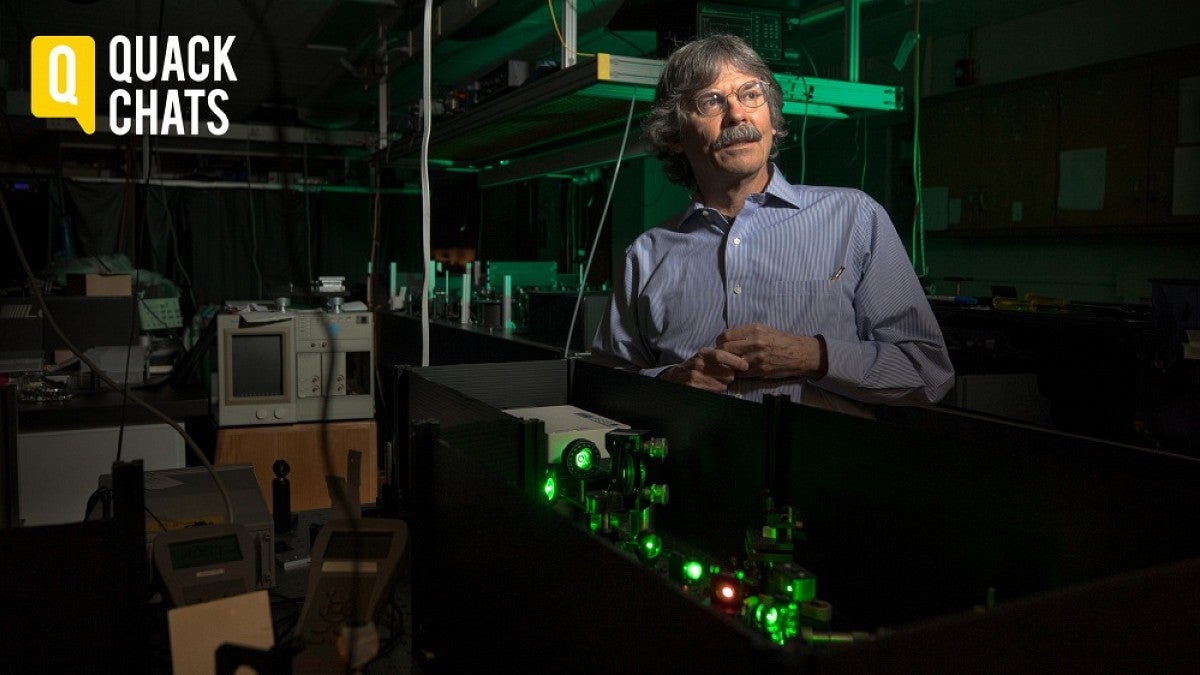UO physicist Michael Raymer literally wrote the book on quantum physics, so who better to host a public talk on “The Coming Revolution in Quantum Technology.”
“In the next five years, there will be quantum computers operating, and when we say they will be faster, it might not just be 10 times faster, it might be a million times faster,” said Raymer, a Philip H. Knight Professor in the Department of Physics and author of the recently published book, “Quantum Physics: What Everyone Needs to Know.”
Raymer will present a Quack Chats pub talk at 6 p.m. on March 21 at the Ax Billy Grill & Sports Bar at the Downtown Athletic Club, 999 Willamette St., in Eugene. Among other topics, he will talk about quantum computers, which are still considered a nascent technology.
Unlike conventional computers, which are driven by switches that are either on or off, Raymer says a quantum computer would store information in quantum switches or “qubits” that can “superpose” the on and off states simultaneously.
“Quantum computing will be used in problems that are complex and have many almost-as-good answers,” Raymer said. “Interestingly enough, that’s in a sense how the human brain also works.”
Along with quantum computing, Raymer will explore quantum physics more broadly, examining “the cool science” behind it, what nonscientists need to know about it and what further research and development needs to be done to realize its full potential. This comes as physicists embark on a “second quantum revolution” some 100 years after they began studying quantum physics.
“We’re starting to recognize that the strange-seeming, counterintuitive aspects of quantum physics can actually be put to use to create new technologies: quantum communication, quantum sensing and quantum computing,” Raymer said.
The potential applications, Raymer said, include everything from enhancing data encryption to designing new industrial materials to determining the optimal structure of pharmaceutical drugs to creating navigation systems that function without GPS.
Explaining quantum science to nonphysicists is a role that has become comfortable to Raymer. Earlier this year, he welcomed U.S. Rep. Peter DeFazio to campus for a demonstration of quantum physics and photonics — the study of light and its applications —and he’s been actively involved in pushing for a major quantum science initiative at the national level.
Since attending a meeting at the White House Office of Science and Technology in 2016, Raymer has been making the case, along with other scientists, that the U.S. needs to step up federal funding for quantum technology research or risk falling behind other nations including China, which made headlines recently for launching a quantum communications satellite.
For Raymer, the appeal of quantum physics is the way it causes researchersto re-examine their deepest underlying concepts of the physical world. While classical physics describes the world people see around them every day, including such concepts as gravity or static electricity, Raymer says quantum physics describes a world where objects behave in unfamiliar ways that challenge people’s sense of reality.
“High-energy physicists keep boring down deeper and deeper into the subatomic world, into such things as the quarks and the Higgs boson. They want to go deeper and deeper, smaller and smaller, to see how it works,” Raymer said. “In our case we say, ‘Look, we already know a lot about how atoms and light work.’ We’re trying to ask the question, ‘What can we do with that knowledge? How can we turn that around and build something useful with it?’”
For information about Quack Chats and to sign up for advance-notification emails, see http://uoregon.edu/quackchats. To learn more about upcoming Quack Chats, see the Quack Chats section on Around the O. A general description of Quack Chats and a calendar of additional Quack Chats and associated public events also can be found on the UO’s Quack Chats website.
—By Lewis Taylor, University Communications


